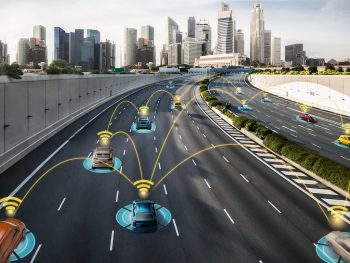UK rollout of self-driving tech to deliver major efficiency and productivity gains
The rollout of self-driving technology in the UK could deliver a £66bn annual economic uplift by 2040 but swift action is needed on legislation to ensure the opportunity isn’t lost.

The report highlights the ability of CAM tech to deliver efficiency and productivity gains in everyday transport and business activities
The call comes from the UK automotive sector as it highlights the benefits to drivers and businesses from the arrival of connected and automated mobility (CAM).
CAM technology enables vehicles to drive without human intervention while connecting with each other and surrounding infrastructure. Potential uses include commercial applications such as self-driving cars and logistics vehicles as well as automated buses, taxis, shuttles and even tractors, delivering efficiency and productivity gains in everyday transport and business activities.
A new report, published today by the Society of Motor Manufacturers and Traders (SMMT), finds that arrival of CAM solutions would “cement the UK’s status as a global leader in this next-gen tech”, and would also create some 342,000 additional jobs across the economy from now to 2040, with 12,250 in automotive manufacturing.
The UK public would also benefit from potentially lower insurance premiums, less stressful commutes and greater freedom for those with restricted mobility, while businesses could move goods and perform industrial processes more efficiently.
The technology could also save some 3,900 lives in the run-up to 2040, with 60,000 serious accidents prevented across the same period.
But the report, summarising a study by KPMG and funded by Innovate UK, with support from the Automotive Council and Zenzic, calls for the Government to introduce new legislation in this parliament, or risk losing the opportunity.
With a significant public-private investment of more than £600m already committed to CAM testing since 2015, it says the Government and industry must now create the conditions to safely and responsibly deploy the technology across passenger cars, services and commercial and industrial vehicles.
And it says this needs to be combined with an ambitious strategy to support private sector investment and stimulate innovation-driven growth, equip workers with essential digital and software skills through upskilling and reskilling initiatives, and engage the public through comprehensive education and communication programmes.
Mike Hawes, SMMT chief executive, commented: “While fully automated road journeys are still some way off, advances in connected and automated mobility technology means they’re within our future – presenting a significant opportunity to revolutionise transport in the UK. Government must work with all stakeholders to implement the necessary framework needed to deliver this exciting revolution swiftly and effectively, ensuring that consumers can reap the lifesaving and cost saving benefits. Failing to do so risks leaving the UK in the slow lane, jeopardising our competitiveness and impeding growth and job creation.”
To access the report, click here.












